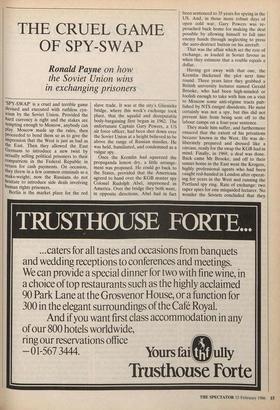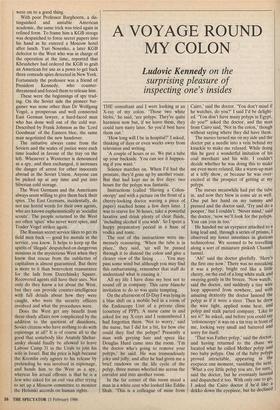THE CRUEL GAME OF SPY-SWAP
Ronald Payne on how
the Soviet Union wins in exchanging prisoners
'SPY-SWAP' is a cruel and terrible game devised and executed with ruthless cyn- icism by the Soviet Union. Provided the hard currency is right and the stakes are tempting enough to Moscow, anybody can Play. Moscow made up the rules, then proceeded to bend them so as to give the impression that the West is just as bad as the East. Then they allowed the East Germans to introduce a new twist by actually selling political prisoners to their Compatriots in the Federal Republic in return for cash payments. On occasion, they threw in a few common criminals as a make-weight; now the Russians do not hesitate to introduce side deals involving human rights prisoners.
Berlin is the market place for the red slave trade. It was at the city's Glienicke bridge, where this week's exchange took place, that the squalid and disreputable body-bargaining first began in 1962. The unfortunate Captain Gary Powers, a US air force officer, had been shot down over the Soviet Union at a height believed to be above the range of Russian missiles. He was held, humiliated, and condemned as a vulgar spy.
Once the Kremlin had squeezed the propaganda lemon dry, a little arrange- ment was proposed. He could go back to the States, provided that the Americans agreed to hand over the KGB master spy Colonel Rudolph Abel, imprisoned in America. Over the bridge they both went, in opposite directions. Abel had in fact been sentenced to 35 years for spying in the US. And, in those more robust days of open cold war, Gary Powers was re- proached back home for making the deal possible by allowing himself to fall into enemy hands through neglecting to press the auto-destruct button on his aircraft.
That was the affair which set the rate of exchange, as loaded in Soviet favour as when they estimate that a rouble equals a dollar.
Having got away with that one, the Kremlin thickened the plot next time round. Three years later they grabbed a British university lecturer named Gerald Brooke, who had been high-minded or foolish enough to take with him on a visit to Moscow some anti-regime tracts pub- lished by NTS émigré dissidents. He most certainly was not a spy, but this did not prevent him from being sent off to the labour camps on a four-year sentence.
They made him suffer, and furthermore ensured that the extent of his privations became known in the West. He was de- liberately prepared and dressed like a carcass, ready for the swap the KGB had in mind. Finally, in 1969, a deal was done. Back came Mr Brooke, and off to their sunset home in the East went the Krogers, highly professional agents who had been caught red-handed in London after operat- ing for years in the West and running the Portland spy ring. Rate of exchange: two super spies for one misguided lecturer. No wonder the Soviets concluded that they
were on to a good thing.
With poor Professor Barghoom, a dis- tinguished and amiable American academic, the same trick was tried again in refined form. To frame him a KGB stooge was despatched to force secret papers into his hand as he entered a Moscow hotel after lunch. Yuri Nosenko, a later KGB defector to the West who was in charge of the operation at the time, reported that Khrushchev had ordered the KGB to grab an American for use as a pawn to get back three comrade spies detected in New York. Fortunately the professor was a friend of President Kennedy, who counter- threatened and forced them to release him.
These were the beginnings of spy trad- ing. On the Soviet side the pioneer bar gainer was none other than Dr Wolfgang Vogel, a prosperous and well connected East German lawyer, a hard-faced man who has done well out of the cold war. Described by Frank Johnson as the 'Lord Goodman' of the Eastern bloc, the same man negotiated the new handover.
The initiative always came from the Soviets and the scales of justice were each time loaded in favour of the tray on the left. Whenever a Westerner is denounced as a spy, and then exchanged, it increases the danger of arrest for other innocents abroad in the Soviet Union. Anyone can be picked up at any time and put into Siberian cold storage.
The West Germans and the Americans always seem willing to give them back their spies. The East Germans, incidentally, do not use horrid words for their own agents, who are known euphemistically as 'socialist scouts'. The people returned to the West are often 'spies' who never were spies, and Trader Vogel strikes again.
The Russian secret service likes to get its field men back — good for morale in the service, you know. It helps to keep up the spirits of 'illegals' despatched on dangerous missions in the mysterious West when they know that rescue from the oubliettes of capitalism is almost guaranteed. But there is more to it than benevolent reassurance for the lads from Dzerzhinsky Square. Recovered agents still have their uses. Not only do they know a lot about the West, but they can provide counter-intelligence with full details about how they were caught, who were the security officers involved and what the procedures were.
Does the West get any benefit from these shady affairs now complicated by the addition to the quotient of dissidents, Soviet citizens who have nothing to do with espionage at all? It is of course all to the good that somebody like Anatoly Shchar- ansky should finally be allowed to leave Labour Camp 31 in the Urals to join his wife in Israel. But the price is high because the Kremlin only agrees to his release by pretending he was involved in espionage, and hands him to the West as a spy, whereas his actual offence is that he is a Jew who asked for an exit visa after trying to set up a Moscow committee to monitor the Helsinki accords on human rights.






































 Previous page
Previous page